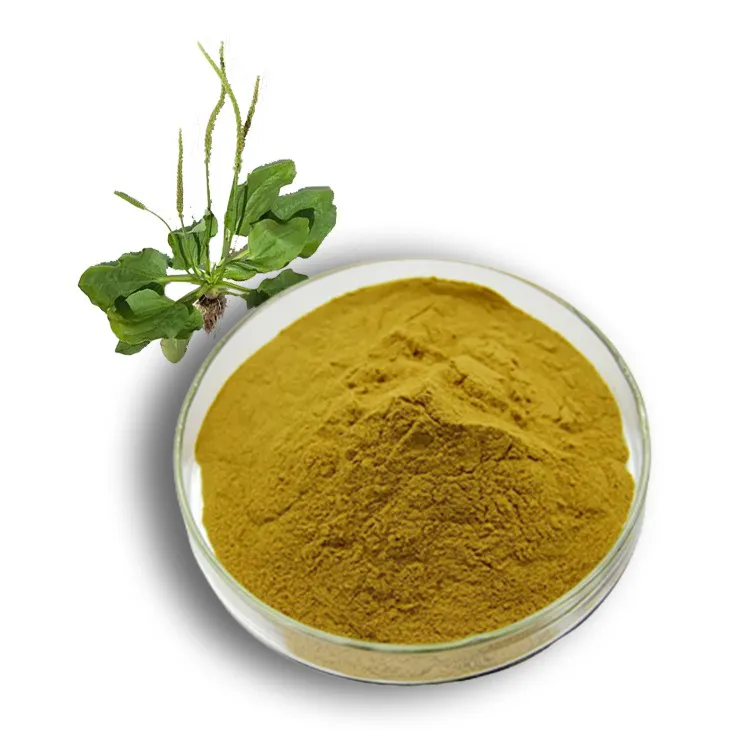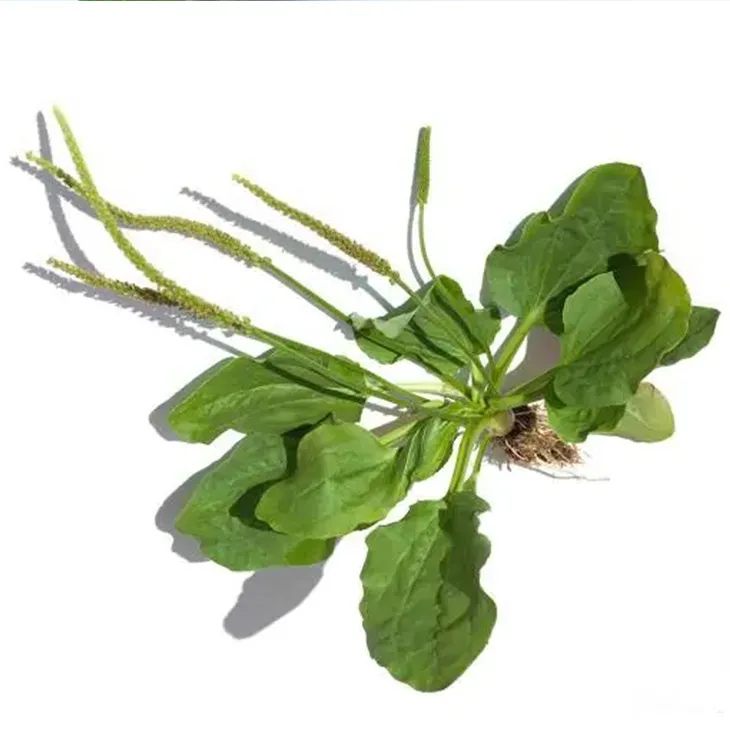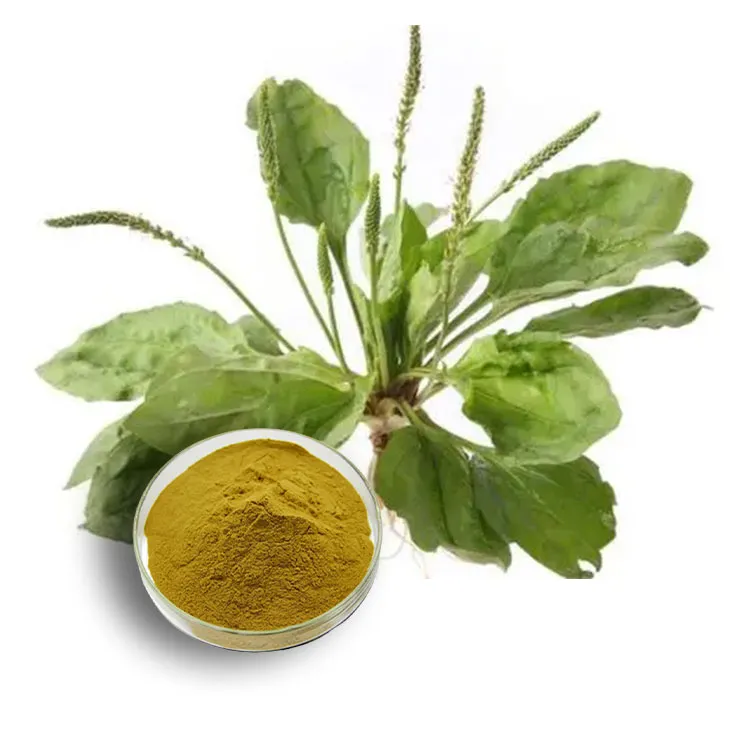- 0086-571-85302990
- sales@greenskybio.com
Five Effects of Plantain Extract + Dosage, Side Effects
2024-11-11

I. Introduction
Plantain extract has been used in traditional medicine for centuries due to its various potential health benefits. In modern times, scientific research has been carried out to explore and understand these benefits more comprehensively. This article will discuss five main efficacies of Plantain extract, the recommended dosage, and possible side effects.

II. Efficacies of Plantain extract
1. Diuretic Effect
Diuretic Action: One of the significant benefits of plantain extract is its diuretic effect. It helps to increase the production and excretion of urine. This can be beneficial for several reasons.
- Fluid Balance: By promoting urination, plantain extract can assist in maintaining the body's fluid balance. Excess fluid in the body can lead to issues such as edema (swelling), especially in the lower extremities. The diuretic effect of plantain extract can help reduce this excess fluid, thereby alleviating swelling.
- Kidney Health: It may also support kidney function. The kidneys play a crucial role in filtering waste products and excess fluids from the blood. By increasing urine output, plantain extract can potentially reduce the workload on the kidneys and help in the elimination of toxins more efficiently.
2. Antibacterial Properties
Antibacterial Activity: Plantain extract has shown antibacterial properties, which make it useful in fighting against various bacteria.
- Combatting Infections: It can be effective against common pathogenic bacteria that may cause infections in the body, such as Escherichia coli (E. coli) and Staphylococcus aureus. By inhibiting the growth and spread of these bacteria, plantain extract may help in preventing and treating bacterial infections, especially in minor wounds or skin infections.
- Oral Health: In the oral cavity, antibacterial properties of plantain extract can also play a role. It may help in reducing the growth of bacteria that are responsible for dental plaque formation, gingivitis, and bad breath.
3. Anti - inflammatory Effects
Anti - inflammatory Action: Another important efficacy of plantain extract is its anti - inflammatory effect.
- Reducing Inflammation: It can help reduce inflammation in the body, whether it is due to an injury, infection, or an autoimmune disorder. Inflammation is a natural response of the body to injury or infection, but chronic inflammation can lead to various health problems. Plantain extract may help modulate the body's inflammatory response, reducing pain, swelling, and redness associated with inflammation.
- Respiratory Health: In the respiratory system, anti - inflammatory properties of plantain extract can be beneficial. It may help in alleviating inflammation in the airways, which can be helpful for conditions such as bronchitis or asthma.
4. Wound Healing
Wound - Healing Properties: Plantain extract has been found to have properties that promote wound healing.
- Tissue Repair: It can stimulate the growth of new cells and tissues at the site of a wound. This is important for the proper healing of cuts, abrasions, and other types of wounds. The extract may also help in reducing the risk of infection at the wound site, which is crucial for successful wound healing.
- Scar Reduction: Additionally, plantain extract may contribute to reducing the formation of excessive scar tissue. This can be beneficial for aesthetic reasons as well as for the overall functionality of the healed area.
5. Digestive Aid
Digestive Benefits: Plantain extract can also act as a digestive aid.
- Soothing the Digestive Tract: It has a soothing effect on the lining of the digestive tract. This can be helpful for people who suffer from conditions such as gastritis or ulcers, as it can reduce irritation and inflammation in the stomach and intestines.
- Regulating Bowel Movements: Plantain extract may also help in regulating bowel movements. It can have a mild laxative effect, which can be beneficial for those with constipation, or it can help firm up stools in cases of diarrhea.

III. Dosage of Plantain Extract
The appropriate dosage of plantain extract can vary depending on several factors, including the form of the extract (e.g., tincture, capsule, or powder), the intended use, and the individual's overall health.
1. Tincture
For a plantain tincture, a common dosage range is typically between 1 - 3 milliliters, taken 2 - 3 times a day. However, it is always advisable to start with a lower dose, such as 1 milliliter, and gradually increase if necessary, while closely monitoring for any adverse effects.
2. Capsules
If using plantain extract in capsule form, the typical dosage may be around 500 - 1000 milligrams per day, divided into 2 - 3 doses. Again, individual needs may vary, and it is important to follow the guidance of a healthcare provider, especially if you have any underlying health conditions or are taking other medications.
3. Powder
When using plantain powder, a general guideline could be to take 1 - 2 grams per day, mixed with water or juice. This can be adjusted based on the specific requirements of the individual and the severity of the condition being treated.

IV. Side Effects of Plantain Extract
While plantain extract is generally considered safe for most people when used appropriately, there are some potential side effects that should be noted.
1. Allergic Reactions
Some individuals may be allergic to plantain extract. Allergic reactions can range from mild symptoms such as skin rashes, itching, or hives to more severe symptoms like difficulty breathing or swelling of the face, lips, or tongue. If any signs of an allergic reaction occur after taking plantain extract, it should be discontinued immediately and medical attention sought.
2. Gastrointestinal Disturbances
In some cases, plantain extract may cause gastrointestinal disturbances. This can include symptoms such as nausea, vomiting, diarrhea, or abdominal cramps. These symptoms may be more likely to occur if the dosage is too high or if an individual has a particularly sensitive digestive system. If such symptoms persist or are severe, it is advisable to stop using the extract and consult a healthcare provider.
3. Interaction with Medications
Plantain extract may interact with certain medications. For example, if you are taking medications for blood pressure control, as plantain extract has a diuretic effect, it could potentially enhance the effect of these medications and lead to a drop in blood pressure that is too low. Similarly, it may interact with medications for diabetes or other health conditions. It is crucial to inform your healthcare provider if you are taking plantain extract, especially if you are on any prescription medications.
V. Conclusion
Plantain extract offers several potential health benefits, including diuretic, antibacterial, anti - inflammatory, wound - healing, and digestive - aiding properties. However, it is important to use it at the appropriate dosage and be aware of the possible side effects. Before starting to use plantain extract, especially for therapeutic purposes, it is advisable to consult a healthcare provider to ensure its safety and effectiveness for your individual situation.
FAQ:
What are the five effects of plantain extract?
Plantain extract has several effects. Firstly, it has diuretic properties, which can help increase urine production and potentially assist in flushing out toxins from the body. Secondly, it has antibacterial effects, which may be useful in fighting against certain bacteria. Thirdly, it can act as an anti - inflammatory, reducing inflammation in the body. Fourthly, it may have antioxidant properties, helping to combat oxidative stress. Fifthly, it might have a mild laxative effect in some cases, promoting bowel movement.
What is the recommended dosage of plantain extract?
The recommended dosage of plantain extract can vary depending on various factors such as the form of the extract (e.g., capsule, tincture), the purpose of use, and individual health conditions. In general, for dried plantain herb used in tea form, about 1 - 2 teaspoons of the dried herb per cup of boiling water can be used. However, when it comes to standardized extracts in supplement form, it is often recommended to follow the instructions on the product label. Usually, dosages can range from 500 - 1500 mg per day, but it is always best to consult a healthcare provider before starting any new supplement regimen.
What are the possible side effects of plantain extract?
Although plantain extract is generally considered safe for most people, some possible side effects may occur. In some cases, it may cause mild gastrointestinal discomfort such as nausea, vomiting, or diarrhea, especially if taken in large amounts. Also, people with allergies to plants in the Plantaginaceae family may experience allergic reactions, which can include skin rashes, itching, or swelling. Additionally, if plantain extract is used as a diuretic in large doses for an extended period, it may lead to electrolyte imbalances.
Can plantain extract interact with medications?
Yes, plantain extract may interact with certain medications. Since it has diuretic properties, it may interact with medications that also affect fluid balance in the body, such as diuretic drugs or blood pressure medications. It could potentially enhance the effects of these medications, leading to an increased risk of electrolyte imbalances or low blood pressure. Also, its antibacterial properties might interact with antibiotics, although more research is needed in this area. It is crucial to inform your healthcare provider if you are taking plantain extract and any other medications.
Is plantain extract suitable for everyone?
Plantain extract is not suitable for everyone. Pregnant and breastfeeding women should avoid using it without consulting a healthcare provider, as there is not enough research on its safety during pregnancy and lactation. People with pre - existing medical conditions, especially those related to the kidneys, liver, or gastrointestinal tract, should also be cautious. Additionally, those with known plant allergies, especially to the Plantaginaceae family, should not use plantain extract.
Related literature
- The Pharmacological Properties of Plantain Extract: A Comprehensive Review"
- "Plantain Extract in Traditional Medicine and Modern Applications"
- "Dosage Considerations and Safety Profile of Plantain - based Supplements"
- ▶ Hesperidin
- ▶ citrus bioflavonoids
- ▶ plant extract
- ▶ lycopene
- ▶ Diosmin
- ▶ Grape seed extract
- ▶ Sea buckthorn Juice Powder
- ▶ Beetroot powder
- ▶ Hops Extract
- ▶ Artichoke Extract
- ▶ Reishi mushroom extract
- ▶ Astaxanthin
- ▶ Green Tea Extract
- ▶ Curcumin Extract
- ▶ Horse Chestnut Extract
- ▶ Other Problems
- ▶ Boswellia Serrata Extract
- ▶ Resveratrol Extract
- ▶ Marigold Extract
- ▶ Grape Leaf Extract
- ▶ blog3
-
Cranberry Plants and Skin - care Products.
2024-11-11
-
Artichoke Extract
2024-11-11
-
Kidney Bean Extract
2024-11-11
-
Chia Seed Powder
2024-11-11
-
Epimedium extract powder
2024-11-11
-
Nettle leaf extract
2024-11-11
-
Stevia Extract
2024-11-11
-
Sugarcane Extract
2024-11-11
-
Europen Bilberry Extract
2024-11-11
-
Motherwort Extract
2024-11-11
-
Acerola Juice Powder
2024-11-11





















